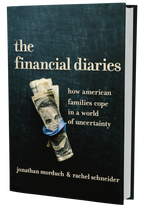|
Our October 16, 2017, topic was Overcoming the Economic Divide. We reviewed a recent article from CNN Money (9/27/17) which states that we in the US are at a level of record inequality that continues to deepen: “The richest 1% of families controlled a record-high 38.6% of the country's wealth in 2016….That's nearly twice as much as the bottom 90%, which has seen its slice of the pie continue to shrink.” We continued our discussion with a recent book that traces the spending habits of Americans on the lower end of the economic scale: Financial Diaries: How American Families Cope in a World of Uncertainty (2017) provides insight into the economic slide that has affected millions of families. The book states that:
 The book describes the spending patterns of numerous struggling families to show that they no longer can depend on a steady income and must scrape by from one paycheck to the next. This volatility leads to unstable homes so that the problems of poverty perpetuate themselves between generations. According to a Federal Reserve study about one third of Americans are “just getting by” and nearly one-half of families have no retirement savings. The book also followed extended families (usually among ethnic groups) that supported each other with interest-free loans and thus were usually more stable, despite low individual incomes. Costco, which has generous employee pay and benefits, was mentioned as an example of a company that has “led to greater customer satisfaction and higher labor productivity.” One major effect of the plight of disillusioned families that is not mentioned in the book is political; many voters who consider themselves left out of the American dream vote for the candidate or party that promises them an exit from their situation. The results became clear in our last election. We next compared viewpoints of Milton Friedman in Capitalism and Freedom and Robert Reich in Saving Capitalism. A sample follows.
A paper from the Harvard Business Review entitled “Why Germany Still Has So Many Middle-Class Manufacturing Jobs” (May 2, 2017) emphasized that about half of the major mid-sized world-market manufacturing leading companies are German. The country emphasizes firms that are unmatched in their field because of the excellence of their products and the intense training provided to their workers who do well financially, and who also do not have to worry about college and healthcare costs because of state-sponsored programs. They have relatively low taxes, but many more people are able to contribute a larger portion because of excellent pay. Also, they focus on the anticipated needs of the world market, often meeting these needs despite the relatively poor natural resources of the country. In the article “Americans Who Need Jobs Aren’t Going Where the Jobs are (May 27, 2017),” Yahoo Finance points out that in our growing economy, many of the best jobs are going unfulfilled in parts of the country (the South and West) while many workers remain stuck in areas that lack jobs (the Northeast and Midwest). In his blog of September 1, 2017, Jared Bernstein pointed out that the “jobs report comes in slightly weaker than expected, but the real problem is slow wage growth.” We discussed the paper “Towards Economic Equality: A Seven Point Program to Ensure a Better Future for Us All,” by the Wellstone Democratic Club Economic Justice Committee. Its main points:
As we have pointed out in this discussion and others, economic divisions have negative effects on those at all levels of society. When the majority of people no longer can pay their bills, the economy weakens and we slip into recession or worse. How To Build an Economy That Works for Everyone
On November 13, we will put together our research and discussions of the last year into comprehensive recommendations for rebuilding our society in a way that brings the social and economic benefits of democracy to those at all levels. Contact Steve for the location if you want to attend. Please recommend this newsletter to people who you think might appreciate it. If you want to be added to the list to be notified when a new newsletter is posted, fill out our contact form and check the box just above the SUBMIT button. You may also use that form to be removed from our list. The Future of Democracy can be ordered wherever books are sold. Click ↓ (#) Comments below to view comments/questions or add yours. Click Reply below to respond to an existing comment.
0 Comments
Your comment will be posted after it is approved.
Leave a Reply. |
 5th edition now available 5th edition now available
Steve ZolnoSteve Zolno is the author of the book The Future of Democracy and several related titles. He graduated from Shimer College with a Bachelor’s Degree in Social Sciences and holds a Master’s in Educational Psychology from Sonoma State University. He is a Management and Educational Consultant in the San Francisco Bay Area and has been conducting seminars on democracy since 2006. Archives
July 2024
Categories |
 RSS Feed
RSS Feed